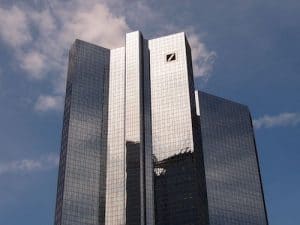 Deutsche Bank’s asset management business incurred an additional €20 million in MiFID II-related costs in the first half of this year, according to the bank’s financial chief.
Deutsche Bank’s asset management business incurred an additional €20 million in MiFID II-related costs in the first half of this year, according to the bank’s financial chief.
James von Moltke was questioned by analysts on the investment bank’s earnings call about the impact of the European regulation since it came into force on 3 January, after Deutsche Bank stated in a report that MiFID II was included in its risk outlook.
“In MiFID II, we are obviously tracking as carefully as we can the impact of MiFID,” Moltke, Deutsche Bank’s Group CFO, said. “Obviously, it’s easier to see on the cost side. So for example, DWS (Deutsche Asset Management) will tell you they have about €20 million of increased expenses in the first half that were associated with MiFID II.”
Deutsche Asset Management reported net revenues were down by €116 million, or 17%, in the second quarter this year compared to the same period last year. At the same time, noninterest expenses for the first six months of the year for asset management were up 6% to €914 million year-on-year.
Within Deutsche Bank’s interim report, the bank stated that lower performance-related compensation and central charges for services from the Group were offset by higher litigation costs, and higher MiFID II-driven external research costs.
Asset managers have been forced to pay for research more transparently, rather than through execution missions or a commission sharing agreements (CSA), as part of MiFID II unbundling requirements.
Handling separate research payments has proved to be one of the most difficult tasks for asset managers under MiFID II. Initially, buy-side firms were expected to adopt the CSA/RPA model, as absorbing costs during a time of squeezed profits seemed unlikely.
However, major buy-side firms including JP Morgan Asset Management, Fidelity International and Deutsche Asset Management opted to fully absorb the costs of research rather than pass them on to the end investor, with a number of firms having to reverse their initial decision as the rest of the market headed towards absorbing costs.
Deutsche Asset Management also created its own internal research division, headed up by the bank’s former head of thematic research Stuart Kirk, in a bid to control its research costs after MiFID II was introduced.
Net income at Deutsche Bank in the second quarter was down 14% overall to €401 million year-on-year. Newly appointed chief executive, Christian Sewing, is overseeing the bank’s significant scale back which will see 7,000 jobs cut and its headcount reduced from 97,000 to around 90,000. Sewing said that Deutsche Bank had accelerated the reshaping of the business significantly in the second quarter this year.
“We’re making important changes to our core businesses as promised, we’re headed in the right direction on costs, and our balance sheet quality is strong. This gives us the flexibility to invest in areas where we have particular strengths,” he said.
So far the headcount at Deutsche Bank has been reduced by around 1,700 full time employees in the second quarter, meaning its total headcount now stands at slightly above 95,4000.